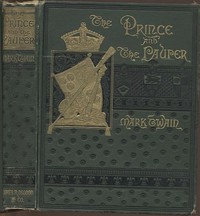The Prince and the Pauper, Mark Twain [bill gates book recommendations .txt] 📗

- Author: Mark Twain
Book online «The Prince and the Pauper, Mark Twain [bill gates book recommendations .txt] 📗». Author Mark Twain
In the Great Hall hangs a large picture of King Edward VI. seated on his throne, in a scarlet and ermined robe, holding the sceptre in his left hand, and presenting with the other the Charter to the kneeling Lord Mayor. By his side stands the Chancellor, holding the seals, and next to him are other officers of state. Bishop Ridley kneels before him with uplifted hands, as if supplicating a blessing on the event; whilst the Aldermen, etc., with the Lord Mayor, kneel on both sides, occupying the middle ground of the picture; and lastly, in front, are a double row of boys on one side and girls on the other, from the master and matron down to the boy and girl who have stepped forward from their respective rows, and kneel with raised hands before the King.—Timbs’ Curiosities of London, p. 98.
Christ’s Hospital, by ancient custom, possesses the privilege of addressing the Sovereign on the occasion of his or her coming into the City to partake of the hospitality of the Corporation of London.—Ibid.
The Dining Hall, with its lobby and organ-gallery, occupies the entire storey, which is 187 feet long, 51 feet wide, and 47 feet high; it is lit by nine large windows, filled with stained glass on the south side; and is, next to Westminster Hall, the noblest room in the metropolis. Here the boys, now about 800 in number, dine; and here are held the ’Suppings in Public,’ to which visitors are admitted by tickets issued by the Treasurer and by the Governors of Christ’s Hospital. The tables are laid with cheese in wooden bowls, beer in wooden piggins, poured from leathern jacks, and bread brought in large baskets. The official company enter; the Lord Mayor, or President, takes his seat in a state chair made of oak from St. Catherine’s Church, by the Tower; a hymn is sung, accompanied by the organ; a ‘Grecian,’ or head boy, reads the prayers from the pulpit, silence being enforced by three drops of a wooden hammer. After prayer the supper commences, and the visitors walk between the tables. At its close the ’trade-boys’ take up the baskets, bowls, jacks, piggins, and candlesticks, and pass in procession, the bowing to the Governors being curiously formal. This spectacle was witnessed by Queen Victoria and Prince Albert in 1845.
Among the more eminent Bluecoat boys are Joshua Barnes, editor of Anacreon and Euripides; Jeremiah Markland, the eminent critic, particularly in Greek Literature; Camden, the antiquary; Bishop Stillingfleet; Samuel Richardson, the novelist; Thomas Mitchell, the translator of Aristophanes; Thomas Barnes, many years editor of the London Times; Coleridge, Charles Lamb, and Leigh Hunt.
No boy is admitted before he is seven years old, or after he is nine; and no boy can remain in the school after he is fifteen, King’s boys and ‘Grecians’ alone excepted. There are about 500 Governors, at the head of whom are the Sovereign and the Prince of Wales. The qualification for a Governor is payment of 500 pounds.—Ibid.
GENERAL NOTE.
One hears much about the ‘hideous Blue Laws of Connecticut,’ and is accustomed to shudder piously when they are mentioned. There are people in America—and even in England!—who imagine that they were a very monument of malignity, pitilessness, and inhumanity; whereas in reality they were about the first sweeping departure from judicial atrocity which the ‘civilised’ world had seen. This humane and kindly Blue Law Code, of two hundred and forty years ago, stands all by itself, with ages of bloody law on the further side of it, and a century and three-quarters of bloody English law on this side of it.
There has never been a time—under the Blue Laws or any other—when above fourteen crimes were punishable by death in Connecticut. But in England, within the memory of men who are still hale in body and mind, two hundred and twenty-three crimes were punishable by death! {10} These facts are worth knowing—and worth thinking about, too.





Comments (0)